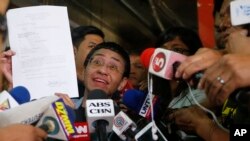The U.N. Human Rights Office is calling on the Philippine judiciary to drop all charges against journalist Maria Ressa. It says pursuing the case threatens an independent media in the country.
Maria Ressa, founder and CEO of the independent news outlet Rappler, was arrested on libel charges earlier this week. She has since been freed on bail.
This is not her first arrest. Ressa, a frequent critic of the policies of Philippines President Rodrigo Duterte, has repeatedly been charged with infractions, such as tax evasion.
U.N. human rights spokesman Rupert Colville says Ressa was charged in an effort to prevent the independent voice of Rappler from being heard. He tells VOA she is being charged with libel or defamation under the Philippines' 2012 Cybercrime Prevention Act.
"It makes on-line libel a crime punishable with up to 12 years in jail. So, it is a pretty Draconian sentence," Colville said. "In the views of international human rights experts, defamation law should not lead to criminal charges and in this case, this law is being used to sentence and silence and threaten journalists."
Colville says the Ressa case is likely to have repercussions on other journalists, pushing many to self-censorship for fear of being punished. He says the public could be deprived of good news reporting as a result.
The U.N. human rights office is calling for a thorough, independent review of all charges against Ressa and other media professionals in the Philippines. It urges the judiciary to safeguard its own independence by throwing out cases that clearly are politically motivated.
It says the charges are not in line with international human rights standards. It adds they also trample on the rights of journalists to carry out their professional duties safely and without fear of reprisal.






